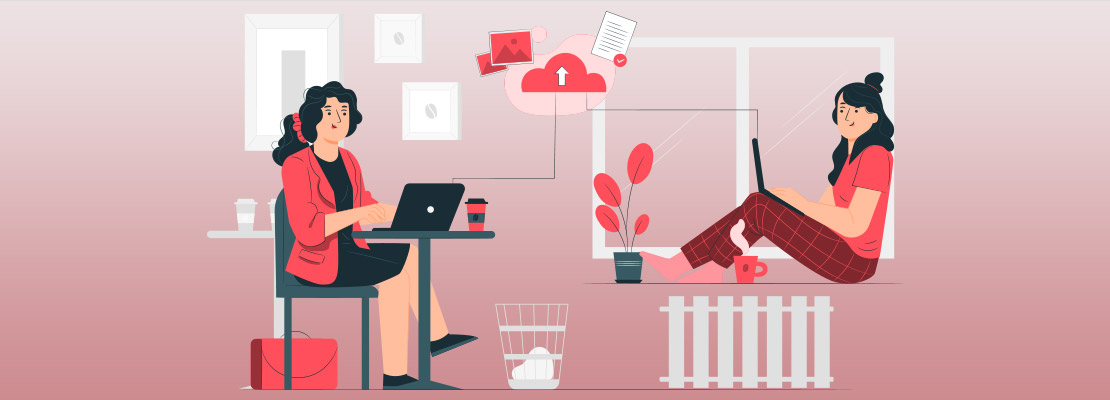How to Work Effectively Remotely while COVID-19
COVID-19 is raging around the world and it seems nothing can stop it. Most countries take preventive measures and close country borders, introduce quarantine measures, close public places, schools, universities and many companies send their employees to work remotely. But for many companies it was all of a sudden and they appeared to be completely unprepared for such a situation and are experiencing infrastructure, communication and management issues.
In this article we would like to share our experience on how to make employees work efficiently remotely.
Basics
To make people work from home there are several ‘must-have’ things that all remote workers need:
- A computer
- A good internet connection
- Chat and conferencing tools
- Access to the company network and systems
And there are several optional things that are good to have:
- A dedicated workspace
- Self-motivation and discipline
- Availability hours
Let’s have a look at the most important things that should not be neglected when working remotely.

Security
At SCAND we take security seriously and eliminate any cybersecurity risks associated with remote working.
All our employees are using only company devices (PCs and notebooks) to work from home. Their devices are protected against loss and theft with options such as full-disk encryption, strong password policy, multi-factor authentication, VPN connection to the organization’s internal network, etc. No access to email and cloud services from an employee’s own device allowed.
All employees are warned to log out when the device is not in use to limit the opportunity for someone to access the computer, not to leave the device unattended, control the use of external devices such as USB storage, etc.
Our IT support team is always at hand, we have a clear understanding how to behave in case something goes wrong with a computer, network, security and even health state.
Remote Team Communication
Apart from technical issues another important point in effective remote work is communication.
Since there is no possibility to be present at the office with the quarantine regime, the only way to get to the employee is communication via chats, video calls, phone calls and emails.
The employees should stay online during the working hours or at least have “available hours” for conversations. Even if the teams are managed by the customer directly (outstaffing model) we are contacting them to ask how things are going.
If employees are silent, then managers might have a feeling of loss of control. In this regard, we advise managers to: initiate a conversation, make daily stand-ups, simply have a voice conversation with the employees, inform them about important changes.
People are lacking face-to-face communication, which they used to have, so giving them a chance to speak out during a video or phone call is a good opportunity to fill this gap.

Management and Reporting
Remote working is not the same as working in the office. From a distance, the importance of project management tools, bug tracking systems is increasing. It is no longer “I will come and explain”, tasks with the name “Bug1” in JIRA and so on. Full description of a task desirably with screenshots and supported documentation is a way to do things.
We strongly recommend informing the team on all the requirements and crucial information on the project. If vital details show up after some work is done, it will slow down the development and release as well as demotivate the team.
To keep track of remote employees, we use time tracking software to ensure employees are actually doing the work they are being paid to. We are setting up task deadlines and making sure the employees meet that deadline.
Self-Management and Discipline
It is very unlikely that all the employees will have an ‘ideal’ working space and atmosphere like at work. They might leave for personal affairs, ignore some questions in the chat or delay in answering which might affect the whole team work. It is all about self-discipline and responsibility.
Great tips to be self-organized when working remotely:
- Get up the same time as previously, do not allow yourself to sleep a few more hours as nobody sees you.
- Start working at the same time as in the office.
- Create an ‘office like’ working place.
- Set up the task plan for the day.
- Have a lunch break and/or a walk as you’ve previously had at work.
- Ask questions, do not ignore your colleagues, interact.
Interaction is a key to the effectiveness of the team in the current state of things.
Philosophically, the world will never be the same again after COVID-19. Most people will learn how to live and work in isolation, adapt to new circumstances and overcome the difficulties. Apart from that a great number of new businesses providing goods and services for remote living will appear as well as the number of apps to order, buy, deliver the goods online will increase. COVID-19 is challenging us in ways we’ve never been tested before.
Stay safe – and healthy!












